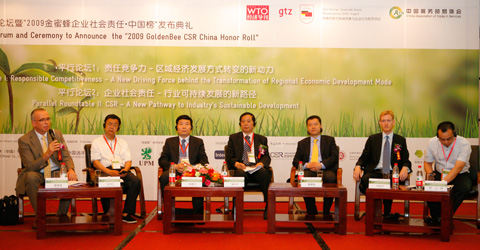Apple Inc. Making Progress on Sustainability In China, Though Workers and the Environment Still Deserve Better
Ever since I got a sneak peak at the evidence Chinese environmental groups recently leveled against Apple, I’ve been researching, gasping, and writing about some appalling practices and how to improve them. Not only does the production of personal electronics rank low on social and environmental impacts, but Apple’s practices put it at the bottom of a very gross barrel.
Since I’m trying to make things better rather than sink into misery, I thought it was time I update a little of the progress that’s been made since I wrote my “open letter to Apple.” (original version here, to ChinaDialogue version here).
Note: I have always been a big fan of Steve Jobs and feel saddened by his early demise. I note that it is important to grieve, but grief is not a reason to stop making progress on this very important issue. On the contrary, I think that Apple should work to improve the social and environmental impacts involved in manufacturing its products as a way to burnish and secure the legacy of its founder.
Apple Opens Up, But More Progress Needed
First, and most importantly, Apple apparently has broken its silence and agreed to speak with NGOs and other stakeholders about the alleged social and environmental issues at its suppliers in China. (See the ChinaDialogue article “Apple Breaks its Silence” by Xie Xiaoping).
This is positive–even amazing–news which shows, just maybe, that Apple’s sustainability team is waking up to the power of effective stakeholder engagement.
For a very informative look at how a big brand used stakeholder engagement to overcome major difficulties, read the MIT Sloan Review article “How Gap Inc. Engaged With its Stakeholders” by industry veteran Sean Ansett and colleagues.
Conclusions from “How Gap Inc. Engaged With its Stakeholders” that Apple might benefit from:
- Stakeholder engagement is not easy; the process is often expensive and slow.
- Identifying and prioritizing stakeholders can enable a company to focus on developing relationships with a few key stakeholder organizations.
- Over time, Gap’s stakeholder engagement strategy has improved perceptions of the company.
I hold my breath that Apple will increase sustainability information transparency. The company still seems to see its supply chain as a risk to its brand, rather than an opportunity to engage and bolster its brand, much less begin to lead the IT industry toward greater transparency and responsible management of manufacturing impacts.
Holding Tech Companies Accountable through Stronger International NGO and Media Action
Secondly, I take issue with how the press characterized the August 31, 2011 revelation in the IPEA report “The Other Side of Apple (II): Pollution Spreads Through Apple’s Supply Chain” story as simply about how Chinese environmental groups were accusing Apple of misdeeds, rather than investigating the claims themselves. I am glad the story made headlines, but not investigating further seems like bad journalism.
On a larger and wider note, the press has almost universally failed to address the more systematic concerns the report brought up, like whether Apple should be exempt from taking responsibility for the ways in which its products are made. Some stories are exceptions, which I note below.
I guess I should be happy that the story got headlines in almost every major newspaper. I just hope the issues do not get swept aside. Now that the world is over the shock of the loss of Steve Jobs, how long before the admiration Apple fans have gets wedded to a serious movement to hold technology companies to account?
As he told TechCrunch, Monologist Mike Daisey characterizes Apple’s current manufacturing processes as Apple’s “terrible sin.”
He also points the finger at himself and everyone listening to say it’s “irresponsible for us not to consider” these issues. I completely agree with him. In fact, Daisey has become one of my favorite public figures, not just for his consciousness-raising work on Apple (I have yet to see, read or hear his latest work “the Agony and Ecstasy of Steve Jobs”), but because he is also so articulate, expressive, and expressive while also being very socially aware, and engaged enough to do something about his feelings.
Daisey rightly points out that “there are no nonprofits within the tech industry that are even concerned with these issues.” He adds, “There’s no one even petitioning these companies in the first world to have independent monitoring in the third world.”
Daisey states (incorrectly) that there is “nobody [monitoring] on the ground in China.” What I would say is that there are not as many people on the ground as there should be. There are a number of international voluntary standards and company codes of conduct that are dedicated to improving working conditions in China and around the world. His point, I think, is that Apple and other tech companies have chosen to spend more resources trying to prevent consumers and the public from seeing what is happening in factories than on improving conditions there. Such backward stances by these companies go against the historical currents of our times, which flow toward more transparency, not less, and hopefully, over time, lead to more sustainability outcomes that improve everyone’s circumstances. In an era of economic globalization, we need solutions like international voluntary sustainability standards adequately applied to lift everyone’s boats.
To illustrate just how silly it is to try to prevent supply chain transparency, even NGOs and consumers in China are starting to wake up to social and environmental issues. (See this story on Al-Jazeera, from which the picture above was taken).
This video of Mike Daisey is very eye-opening, entertaining, and visionary (sorry, the video doesn’t seem to be displaying, despite the embed, so click here to view the video, accompanying TechCrunch story, and other videos from the interview):
Other Stories about Apple
Thirdly, since writing the open letter to Apple, I have come upon many more resources and articles about Apple and I’d like to share them. A big thanks goes to folks like Rich Brubaker at CollectiveResponsibility/All Roads Lead to China/CEIBS and other comrades in the sustainability sector in China. I thank Rich, in particular, for introducing me to Mike Daisey’s work.
Here are some other stories about Apple and Jobs that I haven’t linked to elsewhere in this post:
- If you too like Daisey’s message, read his op-ed in the New York Times, “Against Nostalgia” which is both a great tribute to Steve Jobs and also a potent call to action on tech sustainability and worker rights;
- An interview with Daisey on our friends Gothamist;
- A critique of Steve Jobs’ leadership style on Gawker: “What Everyone is Too Polite to Say About Steve Jobs“;
- Funny story about how Steve Jobs’ life would have been different had he been born Chinese (written in Chinese). ie, all his good ideas are stolen by Tencent and he ends up working at Foxconn, etc.;
- “Time for Apple to Open its Factories” in the Financial Times;
- “Steve Jobs: The Anti-Davos Davos Man” on ZDNet.
The Human Side of Tech Manufacturing
Lastly, through reviewing this information, I have come to see more of the human side of global manufacturing. Yes, I’ve toured factories in China before, yes I’ve read statistics, written reports, interviewed manufacturing company presidents, attended stakeholder meetings of international labor standards like Social Accountability International (SA8000) in China, read Peter Hessler’s books, and so on, but I had never thought about workers in quite the same way as after seeing this brief documentary/video “Dreamwork China,” which interviews and photographs Foxconn workers:
Click on Dreamwork China to see more.
I look forward to watching how journalists, supply chain experts, responsible investment gurus, CSR managers, members of civil society, researchers, policy experts, and others respond to Apple’s invitation to help get its house in order. I hope these stakeholders work together to implement a long-term vision and spur Apple along the noble path, even if it strays.



